

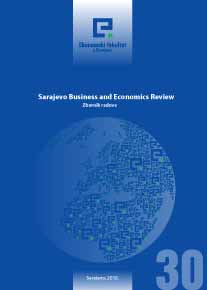
Keywords: foreign direct investment; multinational companies; investment climate; risk; Bosnia and Herzegovina
This paper intends to show key characteristics of foreign direct investment and their importance to the economy of a country. In the case of foreign direct investment both foreign investors and host country seek to maximize their own benefit. However, both sides are facing a number of risks and problems which present a big obstacle to the realization of their ideas. Final result of the entire process of foreign direct investment depends primarily on the degree of development of the domestic economy and the ability of local governments to make the best possible way to exploit the benefits of foreign direct investment. Transition countries, which include Bosnia and Herzegovina, need foreign investment for a successful and sustainable development, considering that these transition countries lack capital. To attract foreign investors, it is necessary to establish a favorable investment climate and use efficiently a rich range of incentive measures available to governments. This paper shows that BiH has not yet created a stimulating environment for foreign investors and as a consequence BiH has noticeable lagging behind neighboring countries, the negative effects on economic development in BiH, insufficient usage of its own economic potential and a decline in life standard.
More...
Keywords: Telekom Srbija; Public Interest
More...
Keywords: politics; Serbia; constitutional state; constitution;
Article about political situation in Serbia and the question of new constitution.
More...
Keywords: philosophy;
Review of the book "Soi-meme comme un autre / Sopstvo kao drugi" by Paul Ricour.
More...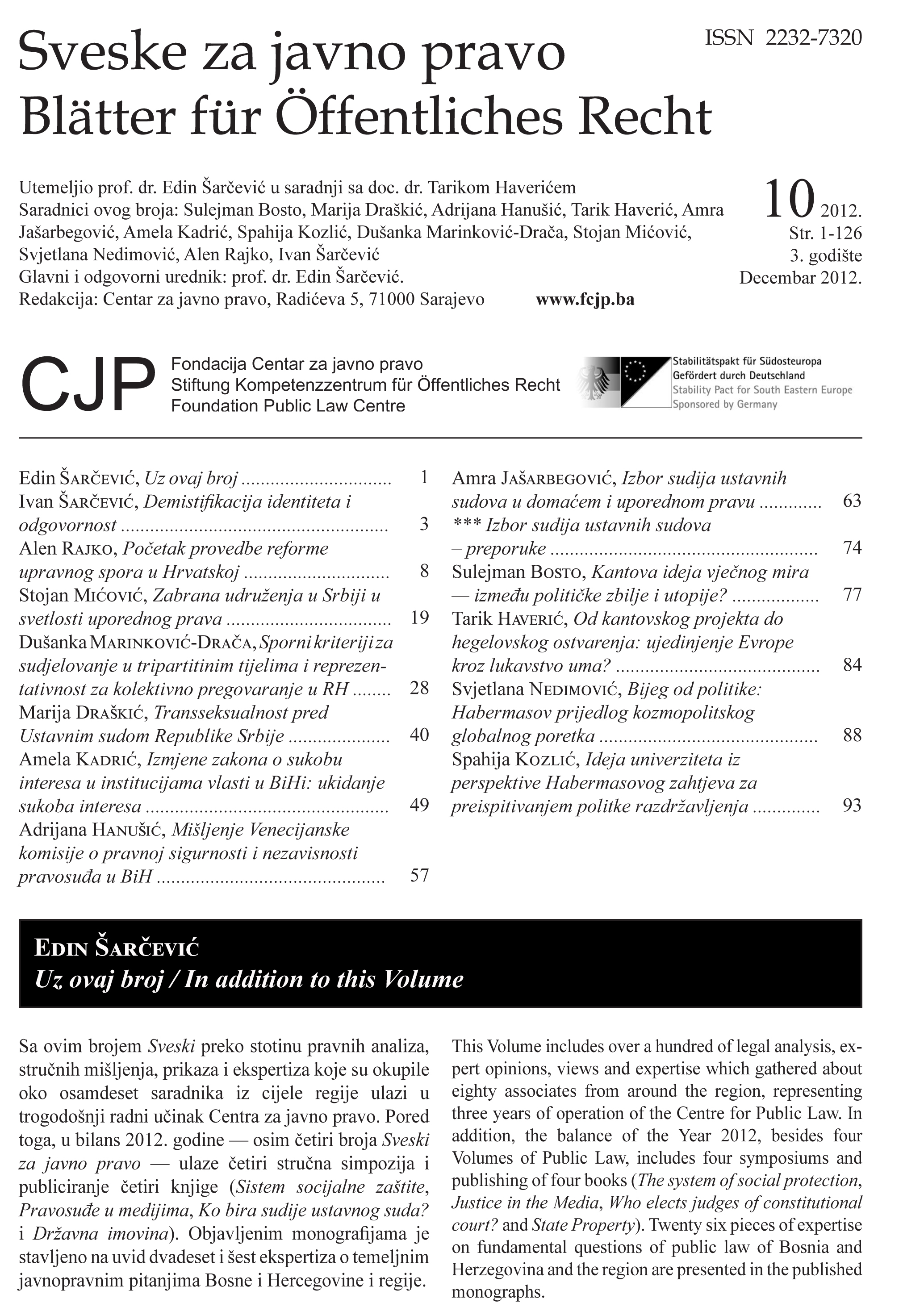
Keywords: Criteria; Republic of Croatia; Collective Bargaining; Tripartite Bodies;
The Law on the Criteria for Participation in Tripartite Bodies and Representativeness for Collective Bargaining in the Republic of Croatia establishes the criteria and procedure for determining the representativeness of employers’ and trade unions’ confederations for participation in tripartite bodies at the national level. It also establishes the method of determining the representativeness of employers’ associations, trade unions and their confederations for participation in tripartite bodies at the local and regional level. The Law also regulates the criteria and procedure for determining the representativeness of trade unions for collective bargaining and it determines the rights of representative organizations. In addition, the Law repeals prolonged application of collective agreements effecting, particularly in the public sector, significant reduction of labor costs. The Law was adopted without joint consultation of employers’ associations and trade unions and, thus, further affected the already fragile dialogue. There is much criticism from legal experts, in the terms of undermined trade union freedoms and guaranteed autonomy and in terms of uncertainty, poor nomotechnics, vagueness and superficiality. Therefore, the Constitutional Court’s decision is awaited with great interest as proceedings of constitutional review were instituted for the revision of a significant number of the provisions of that Law.
More...Правни историчари из бројних универзитетских центара широм света окупили су се педесет осми пут на Конгресу који организује међународна асоцијација правних историчара...
More...Keywords: insurance; insurer; insurance contractor; insured; premium; insurance cover; secured case; risk; secured sum; civil responsibility;
Insurance is an economic activity in which entities are protected against various dangers that endanger their property or physical integrity. The subject of insurance can be persons, things (real estate, property) or interests from legal relations (contractual or non-contractual), as well as various other interests of a legal or economic nature. Insurance can be viewed from a legal, economical, technical, sociological and other. viewpoints. The human community is faced with the existence of various dangers that endanger the individual and the collective, and because of that, there has been an awareness of the need for organized protection against these dangers. If one risk is distributed to several holders (atomizers), it is more certain that a person who has suffered a risk of a joint threat will succeed in reparation, or compensate for the damage suffered.
More...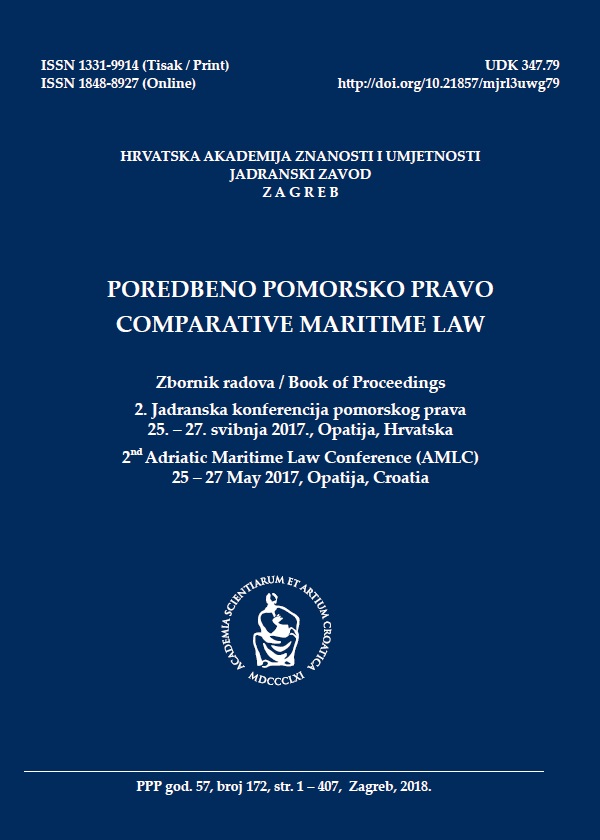
Keywords: nautical tourism ports;navigation safety;marinas;port order;
According to the Maritime Code, the Maritime Domain and Seaports Act and the Ordinance on the Conditions and Mode of Ordering in Ports and Other Parts of the Inland Waters and Territorial Sea of the Republic of Croatia, the concessionaire of each individual port of nautical tourism must issue an ordinance on the order in the port and conditions of use of the special purpose port. This is a legal requirement arising from the legal status of the concessionaire of the nautical tourism port, as its managing body. Such Ordinance shall in particular regulate the means of traffic management in the port, and the purpose of particular shore areas in the port, whereby the concessionaire in the ports of nautical tourism shall be obliged to take into account the needs for permanent transit and operational berths. Furthermore, apart from prescribing the purpose of individual port areas, the Ordinance also prescribes the reporting procedures, as well as the entering,mooring, berthing, moving, anchoring and leaving procedures of vessels and how they ought to be controlled, which is of vital importance for the safety of navigation and the protection of human life at sea. The Ordinance on the Order in the Nautical Tourism Port shall apply to the entire land and sea area of the Port, in accordance with the Maritime Concession Contract for the Construction and Use of the Port. The Ordinance on the order in port confirmed by the competent port authority shall be effectively publicized. However, the question that arises is what extent of power nautical port authorities have if the ordinance provisions are violated, i.e. what are the powers of competent maritime administrative and state authorities (Harbour Master, police). In this paper, the authors analyze the scope and responsibilities of the nautical tourism port concessionaires with regard to maintenance of the order in the port. Above all, they explore its legal and practical role in ensuring the necessary standards of navigation safety, as well as the implementation of these powers in the practice of domestic ports of nautical tourism (marinas), with reference to available statistical data that point to the actual standards of navigation safety in domestic ports of nautical tourism (marinas).
More...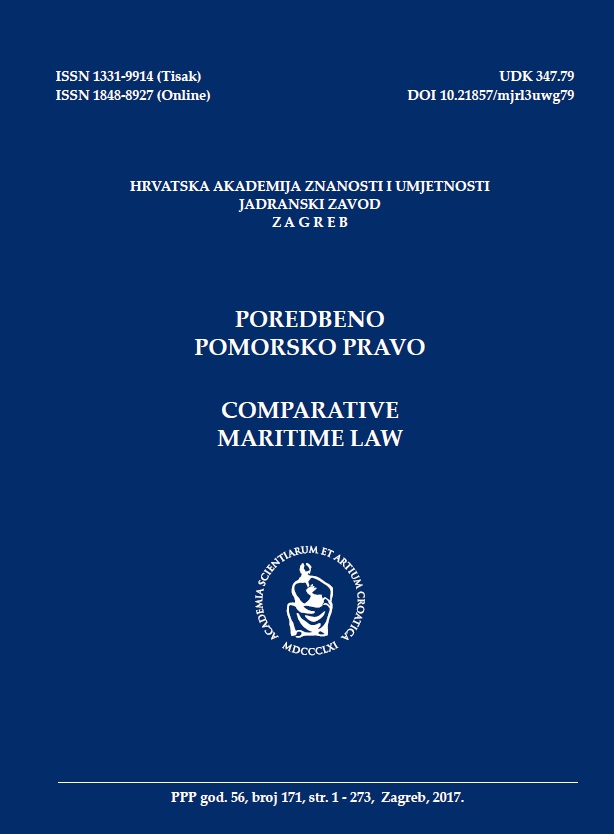
Keywords: bareboat charter; BARECON 2001; charter contract;
This paper analyzes provisions of the BIMCO standard bareboat charter form, code name BARECON 2001, contained in its second, central part. The analysis consists of several themed sections. Firstly, contractual parties in the bareboat charter are determined, introductory terms definitions are cited and the specifics of the duration of the bareboat charter are established. Fundamental rights and obligations of the parties (delivery, cancelling, hire, redelivery) are determined afterwards, followed by all other rights and obligations related to the use and performance of the contract (e.g. regulation of the vessel’s inspection costs,oil and stores on delivery and redelivery, inspection, trading restrictions, maintenance and operation, insurance, mortgage and lien, indemnity, realization of the right to remuneration for salvage and a general average contribution, wreck removal, conditions for transfer of rights from the contract to a third party, bank guarantee, commission, termination, repossession,dispute resolution, notices). A comparative analysis of the BARECON 2001 central part provisions and the previous BARECON 89 relevant provisions is presented, as well as a critical review of the BARECON 2001 provisions, considered to be ambiguous, and possibly giving rise to various legal interpretations. In conclusion, solutions of the provisions of the form are summarized and several proposals for improvement of its content are given.
More...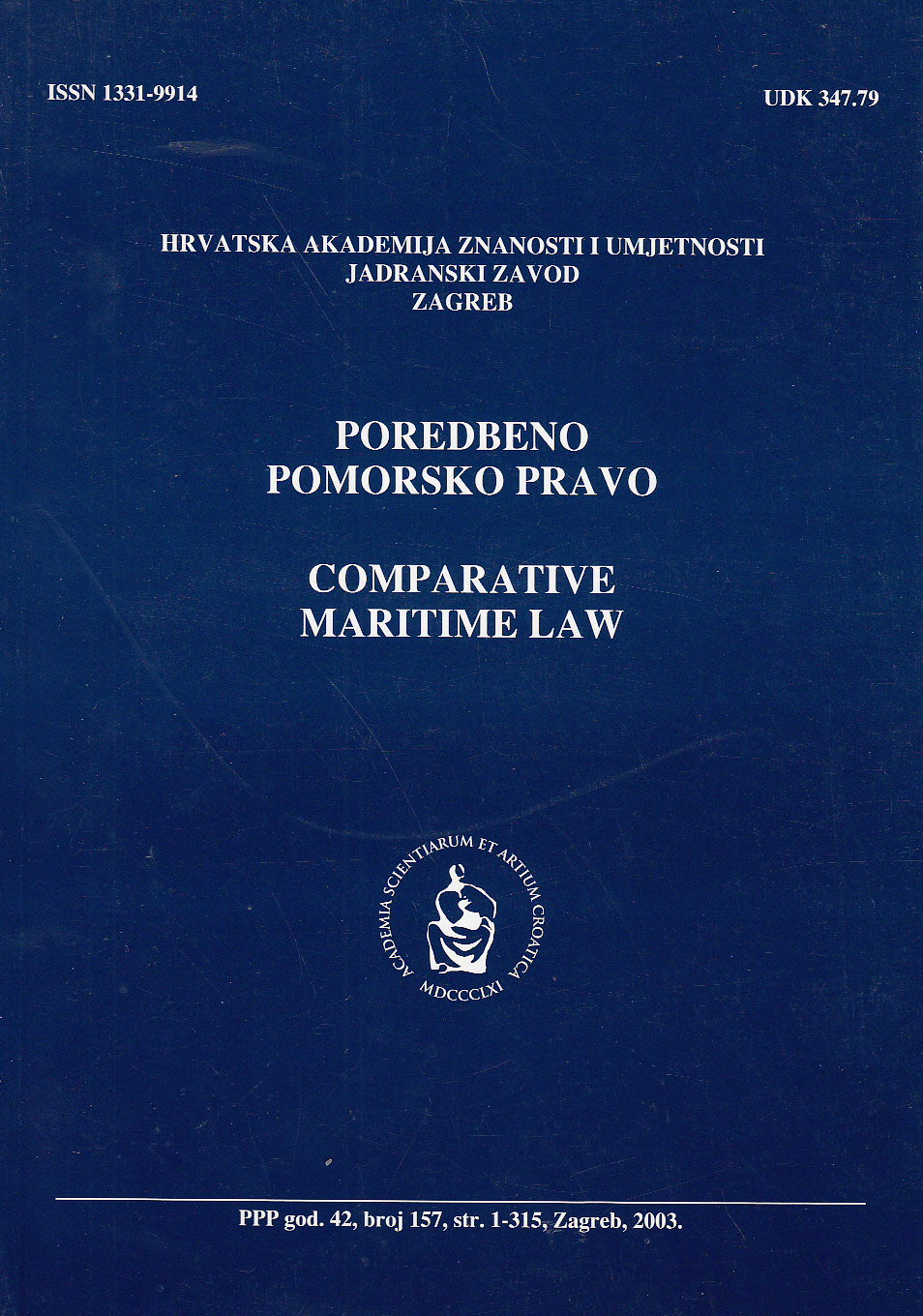
Keywords: carrier; ship operator; shipowner; charterer; contract of carriage of goods by sea; Croatian Maritime Code
In this paper the author analyzes the provisions of the Hague and Hamburg conventions and the new Draft Instrument on Transportation Law that determines the position of the carrier. The central issue in this paper is the identification of the carrier in Croatian Maritime Code de lege lata and de lege ferenda. This paper discusses which persons can appear as a carrier, and whether Croatian law has provided adequate standards for this problem. For understanding the complex relations between the contractual parties that arise in concluding and fulfilling a contract is necessary to know the legal nature and taxonomy of the contract. This is particularly examined in our work with special reference to some theoretical dilemmas, and theoretical opinions. There is discussion of the obligations and rights of the carrier, its legal character, and a description of how it participates in the risks and benefits that arise from the use of the ship for the purpose of transportation of goods by the sea. Particularly analyzed are solutions and new regulations proposed in the Draft of the Croatian Maritime Code and current court practice is discussed. In the Croatian Maritime Code, a positive evaluation is given to the introduction of the concept 'carrier' as the party in the carriage contract. This brings the Maritime Law up to date and closer to the solutions in international unification instruments. It is stressed that priorities for analysis lie in an ongoing monitoring of the quality (the adequacy and adaptation) of the standards and their realistic ability to cover the factual forms that are created in practice.
More...Keywords: Corruption; Bribery; Immoral contracts; Mistake; Fraud; Agency; Ultra vires act;
Corruption in the form of a contract of bribe appears in very different forms (material or non-material rewards, given through some known legal forms or secretly, followed by visible or invisible favours by the bribed person, etc.), and it is frequently bordering with the allowed legal acts (e.g. mandate contract commission).The key elements of the notion of bribery in contracts are: 1. Giving certain valuable consideration in exchange for favouring the briber; 2. Secrecy of the act of giving a reward; 3. Counterprestation (influence) of the bribed in view of concluding a contract in favour of the briber. A contract of bribe is an immoral contract and, as such, it is void with all implied consequences. Nullity can be officially referred to by the court itself. Speaking about consequences of the nullity of a contract due to bribery, the rule of Nemo auditur turpitudinem suam allegans has an important role for the restitution of the reward given. The contract concluded between the briber and a third party, for which the bribed person had been given a reward (bribe), i.e. the so-called basic contract is not void. However, its validity can be questioned in certain circumstances. When the other contracting party finds out that the contract it concluded was achieved due to the bribing of its representative or employee, or a third party, it may refer to the Code of Obligations governing mistake or fraud. If the contract is rendered void due to those reasons, the return of the given reward is discussed in accordance with the law of unjust enrichment. Moreover, the party acting in good faith is entitled to damages.
More...
Keywords: East Europe; Yugoslavia; Elections; Serbia;
The embracing changes in Eastern Europe are not thus much result of outgrown democracy as a result of deprivation of fate and self-containment of the ruling elites. They are result of enduring process of deligimation. As for social and political changes in Yugoslavia they are considered in twofold manner: partly as an response on challenges of surroundings, partly with a view to the ventures towards the change in the relation of power between the national elites in the federal setting. Both could be seen through immense politisation of ethnos and the culture. Results of these efforts are provided in strong preferences of the Northwest towards self-containing national states whereby Yugoslavia is exposed to prolonged and devastating process of its deterioration.
More...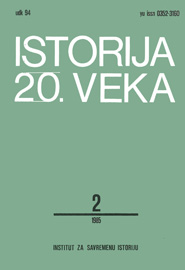
Keywords: WWII; postwar period; Slav countries; policy of integration; Soviet Block;
В данном сравнительно кратком очерке в форме этюда обсуждаются проблема и характер взаимосвязей славянских народов в период с 1941 по 1948 год. Краткая вводная часть содержит обзор исторического развития и характер этих связей, установленных в первое время на почве культурного сотрудничества и культурного взаимодействия, уступившим в дальнейшем место усилившемуся экспансионистскому и великорусскому курсу, превратившемуся в рычаг царской политики. Автором не оставлены без внимания и перемены, происшедшие в характере связей славянских народов и государств после Октябрьской революции и образования новых самостоятельных славянских государств на юго-востоке и в Средней Европе. Описывается также и новое политическое содержание идей, возникших в период между двумя мировыми войнами. Центральная часть очерка посвящена участи идеи славянской период до 1948 года. В результате второй мировой войны происсолидарности и интеграции во время второй мировой войны и в ходит раскол между славянскими государствами, создаются два воюющих лагеря, а это ведет к различному толкованию славянской идеи: от полного отрицания славянского происхождения (в Независимом Государстве Хорватии) и упора на том, что славянские народы нашли свое место в „новом порядке в Европе на стороне Оси (Болгария, Словакия. Независимое Государство Хорватия), до, с другой стороны, сплочения и солидаризации с борьбой Советского Союза всех славянских антифашистских сил. Самым значительным стимулом для этой тенденции были чрезвычайно тяжелое положение, в котором в ходе войны оказались славянские народы, как и политика всеславянского сплочения вокруг Советского Союза в борьбе против самого заклятого врага славянства, получившая свое начало и направленность с момента германского нападения на Советский Союз. Такая политика достигла свой апогей на двух всеславянских конгрессах, проведенных во время войны в Москве. В течение первых лет по окончании войны произошло усиление идеи о необходимости тесного сотрудничества славянских стран и их сплочения вокруг Советского Союз. Предпринимаются попытки образования более широких сообществ (неосуществленная югославско - болгарская федерация). Однако, эта идея все более открыто становится рычагом блокового сплочения. Присоединение двух неславянских стран, Румынии и Венгрии, к сообществу стран, начавших строить социализм, и выход Югославии из сферы советского влияния во время конфликта с Информбюро, привели к тому, что идея сплочения славянских народов уступила место идеи сполочения на блоковой почве.
More...![Maritime Law : Comparative Legal Study (authors: Ivošević; Pejović) (Beograd, 2019) : [book review]](/api/image/getissuecoverimage?id=picture_2020_58542.jpg)
Keywords: book review; maritime law
Pomorsko pravo (Uporednopravna studija) / Maritime Law (Comparative Legal Study) is a comprehensive textbook of maritime law. In addition, it offers a comparative legal analysis of national maritime legislation in Slovenia, Croatia, Montenegro and Serbia and considers differences between national maritime legislation in Anglo-American and European countries.In the introductory part, the authors define the concept and subject of maritime law by comparing it with other branches of law and other scientific fields that deal with certain aspects of shipping. This section also contains a historical and legal overview of the development of maritime law at the international and EU level as well as at the national levels of selected countries.The first part of the book (“Ship and Shipping“) concerns maritime administrative law (the notion of the ship, ship registers, the safety of shipping) and maritime property law (ownership of the ship, ship mortgage, maritime liens, ship arrest, execution of maritime claims).The second part (“Contracts, Transport Documents and Contractual Liability“) covers the conclusion and performance of various shipping contracts (types of contracts in maritime transport, contracts for the carriage of goods by sea, time charter, voyage charter, liability of the carrier for the goods, bill of lading and other documents, charter by demise, bareboat charter, contracts for the carriage of passengers and their luggage by sea, liability of the carrier for the passengers and their luggage, tug and towing contracts, the maritime agency contract). At the end of this part, the authorsexamine the role of the contract for the carriage of goods by sea in the performance of the international sale of goods.The third part (“Shipping Accidents, Extra-contractual Liability, System of General Limitation of Shipowner“s Liability“) mainly discusses “wet shipping“ (general average, collision, salvage, liability for the marine environment), with a specific chapter devoted to international and domestic laws regulating the limitation of the shipowner's liability.The fourth (final) part (“Marine Insurance“) deals with all aspects of this very important area of maritime law (including the notion and essentials of the marine insurance contract, insurance policy and other documents of insurance, the rights and obligations of contracting parties, cargo insurance, hull insurance, liability insurance, the role of P&I Clubs).The book is written clearly and systematically. It can serve as a high-quality university textbook and will be useful to all lawyers dealing with maritime law. This book will certainly provide the reader with a comprehensive set of information on international maritime legislation and on national legislation in selected countries.
More...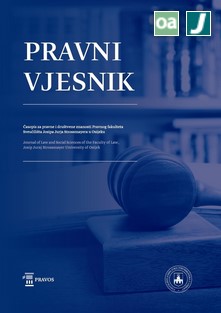
Keywords: Plautus; sale on approval; pactum displicentiae; edict of the curule aediles; Roman law;
The paper deals with the potential existence of sale on approval in pre-classical Roman law, based on the passage “dixit se redhibere, si non placeat” from Plaut’s comedy Mercator (The Merchant). In the first part of the paper, the excerpt and the interpretation of the relevant part of the comedy are presented. The text is then analysed for the purpose of comparison with the characteristics of the classical pactum displicentiae as evidenced in the Digest, whereby Plaut’s fragment would constitute an evidence for the pre-classical origin of Roman sale on approval. In the ensuing analysis, the instruments of possible legal protection of pactum displicentiae and their chronological relation are studied. More specifically, based on the reference to redhibere in Mercator and the use of actio in factum for sale on approval in later period, their possible connection and the time of emergence of the edict of aediles curules and actio redhibitoria has been researched into. In conclusion, the arguments are put forward concerning the significance of Plaut’s fragment in establishing pre-classical origins of Roman sale on approval, as well as on the possible impact of the edict of curule aediles on the development of early legal protection of sale on approval.
More...Keywords: Directive; unfair terms; protection; insurance contract
Today the insurance contract has an increasing importance in our everyday legal transactions. It could be said that according to the frequency of concluding this agreement comes immediately after the contract of sale and contract of carriage. The idea of consumer protection has found its place in the insurance service. In line with current trends in the European Union, in addition to the analysis of certain issues concerning unfair provisions in community law, this paper is dedicated to the issues of protection against unfair contract terms in the insurance contract. Also difference in the economic strength of the contractor, may lead to the position that the stronger contracting party impose unfair clauses. Therefore, in this paper, firstly, author gives a brief overview of the legal regulation of unfair clauses in EU law. Then, in the context of the insurance contract, author analyzes unfair terms in national law. The author aims to present the sources of law in the Republic of Serbia in connection with the protection against unfair terms in consumer contracts and insurance contracts. It starts from the normative complexes with specific qualities and characteristics of this theme.
More...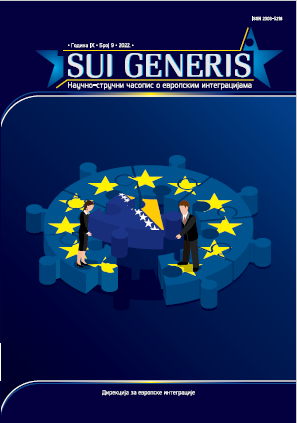
Keywords: European Union; institutions; principle of institutional balance;
As a sui generis supranational organisation, the European Union is specific and unique in its origin, development and functioning, and as such is a constant subject of professional and scientific reflection and research, with the aim of fully understanding and contributing to its continuous integration process, which is equally important for existing and future member states. In this respect, Union's dayto- day and long-term operation is directly dependent on its institutional system, which is mirrored to the same extent by its peculiarities. Therefore, the topic of this paper is particularly focused on the part of the institutional framework of the Union, which includes the European Parliament, the European Council, the Council of the European Union, the European Commission and the Court of the European Union and their mutual relations and way of functioning. Specifically, in line with their competences, the aforementioned institutions act individually or together in numerous community areas, allowing for mutual principled cooperation, but also for inevitable disagreements and diverse interpretations of the same issues. The principle of institutional balance, which serves as the foundation for the actions of the Union's institutions, as well as other relevant principles as well as judicial practice aimed at resolving challenges in matters of jurisdiction, is specifically addressed below in order to fully explore the current relationships as well as the possibilities of improved cooperation. The topic is constantly relevant for the academic and professional community in Bosnia and Herzegovina, given that the next phase of its European integration process is anticipated candidate status for European Union membership.
More...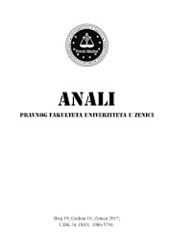
Keywords: intellectual property; copyright; orphan works; Orphans’ Work Directive;
“Orphan works” represent a specific category of copyrighted works, and therefore their position in the intellectual property system is specific. Namely, the subject of copyright protection is an author’s work, as an original, intellectual achievement from the literary, artistic and scientific field, which has an individual character. The author is usually the copyright holder. However, if the author of the work or his legal successor, or the right holder in general, is not known or is known, but it cannot be located, then such a work is considered as an “orphan work”. A large number of orphan works are still protected by copyright, but modern times impose the need for their digitalisation, in order to make these works more accessible to the general public. This means establishing a legal framework that will facilitate the digitalisation and dissemination of copyrighted works, for which no copyright holder can be identified or found. The European Union, with its legislation, primarily the Orphans’ Work Directive, has tried to guide Member States on how to regulate the protection and the use of these acts, with a goal to harmonizing national regulations, but this process is not yet complete due to different archives, and it will still take a long time. These works, whose authors are unknown or cannot be found, form a significant part of the world cultural heritage, but they cannot be used prior a careful search is carried out in order to determine their authors, in compliance with the prescribed conditions. In this regard, and with the aim of more adequate protection of authors, even those unknown or those who cannot be located, it is necessary to harmonize BiH legislation with European Union regulations.
More...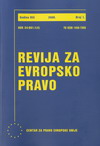
Keywords: non-discrimination; European Union; human rights
A general prohibition of discrimination on grounds of nationality can be found in Article 12 (ex Article 6) EC Treaty. According to this provision, discrimination that can be attributed to a nationality requirement is prohibited within the scope of application of this Treaty, and without prejudice to any special provision contained therein. Community law does not just prohibit direct discrimination. As stated in Article 12 EC Treaty, any discrimination is prohibited. Indirect discrimination arises where a provision is likely to affect EU nationals in the exercise of their Treaty rights disproportionately. It may arise where a condition is imposed which is sought to be justified on the basis that it applies both to those exercising Treaty rights and own nationals, but where the ability of those exercising Treaty rights to satisfy any such condition is intrinsically more difficult.
More...